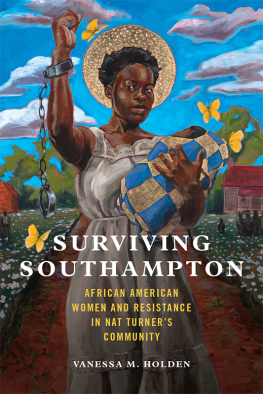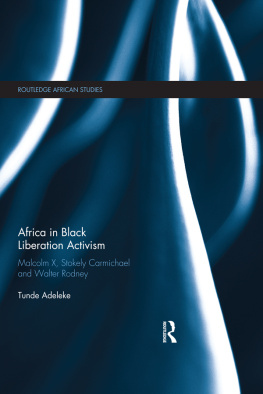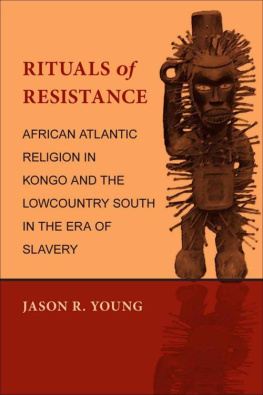Copyright 2006 by Louisiana State University Press
All rights reserved
Manufactured in the United States of America
FIRST PRINTING
Designer: Barbara Neely Bourgoyne
Typeface: Quadraat
Printer and binder: Edwards Brothers, Inc.
Library of Congress Cataloging-in-Publication Data
Rucker, Walter C., 1970
The river flows on : Black resistance, culture, and identity formation in early America / Walter C. Rucker.
p. cm. (Antislavery, abolition, and the Atlantic world)
Includes bibliographical references and index.
ISBN 0-8071-3109-1 (cloth : alk. paper)
1. Slave insurrectionsUnited States. 2. Government, Resistance toUnited StatesHistory. 3. SlavesUnited StatesSocial conditions. 4. African AmericansHistoryTo 1863. 5. African AmericansSocial life and customs. 6. African AmericansEthnic identity. 7. African AmericansRites and ceremonies. 8. FolklorePolitical aspectsUnited StatesHistory. 9. United StatesHistoryColonial period, ca. 16001775. 10. United StatesRace relations. I. Title. II. Series.
E447.R83 2005
306.3620973dc22
2005010249
The paper in this book meets the guidelines for permanence and durability of the Committee on Production Guidelines for Book Longevity of the Council on Library Resources.

Acknowledgments
Along the winding path I took in writing this manuscript, a number of individuals proved quite helpful. I owe my largest debt to Sterling Stuckey, who served as my dissertation advisor. Despite his initial misgivings about the project, I vividly remember Sterling informing me that I was on to something after reading the first chapter. Since that time he has been the ever mindful mentor and though I have not always followed his sage advicewhich has created some tensionsthis project owes a great deal to the scholarly example he has set. I should add that all the interpretive or structural shortcomings of this work are my own.
Many others have provided invaluable assistance and encouragement along the way, whether through private conversations, questions raised at conference panel sessions, or careful readings of chapters or the entire manuscript. They include Ray Kea, Sharon Salinger, John Wunder, Herbert Aptheker, John Thornton, Margaret Washington, Jim Rawley, and Linda Heywood. In some significant way, all of their input was useful. Michael Gomez provided the most insightful critiques of the full manuscript, and I will be forever indebted for his guidance and support.
I have also received support from my former colleagues at San Bernardino Valley College, the State University of West Georgia, and the University of NebraskaLincoln. In particular, Colleen Calderon read and commented on my work during the very early phases of my research. Also, Leon Caldwell allowed me to accompany a group of his students on a three-week study-abroad program in Ghana. The insights I gained by visiting the Elmina and Cape Coast slave dungeons, learning rudimentary Twi, and informally interviewing Akan-speaking spiritualists greatly enriched my discussions of slavery, culture, and Akan spirituality in the chapters on Gold Coast African imports into colonial New York. In addition, I am indebted to the following peoplefriends and colleagues alikefor their support of my work over the years: Jermaine Archer, Leslie Alexander, Hasan Jeffries, Akinyele Umoja, Marcellus Barskdale, Alton Hornsby, Zawadi Barskile, Augustine Konneh, Cita Cook, Cecil Blake, Pete Maslowski, Jason Young, Keith Parker, Ahati Toure, Kwakiutl Dreher, Wendy Smooth, Eloy Zarate, Dandra Orey, Tim Mahoney, Ben Rader, James Garza, Carole Levin, Marcela Raffaelli, Jim Le Sueur, Daniel Walker, Venetria Patton, Tom Calhoun, and Ken Winkle.
My thanks also to the University of NebraskaLincoln for funding I received to support this research. Financial support from the Research Council and the Layman Trust made possible my extended stays at archives and research libraries in South Carolina, Virginia, New York, Louisiana, California, and Legon, Ghana. A National Endowment for the Humanities Summer Stipend proved quite useful in this regard as well. A number of research facilities were quite gracious during my visits. The staffs of the following libraries and archives were particularly helpful: the New-York Historical Society Library, the New York Public Library, the New York City Municipal Archives and Records Center, the Virginia Historical Society Library, the Virginia State Library, the Huntington Library, the South Caroliniana Library, the South Carolina Historical Society Collection, and the South Carolina Department of Archives and History. The Interlibrary Loan staff at the University of California Riverside provided me with tireless and invaluable service from the very beginning of this project.
Finally, to my mother Sarah, my daughter Njeri, and my son Naeem, who provided the best encouragement and incentive during this long journeyI dedicate this manuscript to them.
Chapter 5 appeared previously in slightly different form as I Will Gather All Nations: Resistance, Culture, and Pan-African Collaboration in Denmark Veseys South Carolina, Journal of Negro History 86 (Spring 2001): 13247. Chapters 1, 5, and 6 appeared previously as Conjure, Magic, and Power: The Influence of Afro-Atlantic Religious Practices on Slave Resistance and Rebellion, Journal of Black Studies 32, no. 1 (September 2001): 84103. Used by permission.
The River Flows On
Introduction
In the 1968 introduction to his novel Black Thunder, Harlem Renaissance writer Arna Bontemps claimed he had chosen Gabriel Prosser as the subject for his fictional account because Gabriel had not depended on trance-like mumbo jumbo. A devout Seventh Day Adventist, Bontemps felt that Nat Turner, with his visions and dreams, and Denmark Vesey were influenced by disturbingly esoteric religious influences that significantly detracted from their overall image. He saw Gabriels 1800 conspiracy in sharp contrast as devoid of these factors. Of course this guidance in the fictional account was more about wearing charms and using protective hands than seeking inspiration from the Bible.
The trance-like mumbo jumbo that Bontemps sought to avoid in Black Thunder was so ubiquitous in colonial and antebellum America that even the fictionalized Gabriel Prosser could not fully escape its influences. Noting that enslaved African Americans remembered Africa in 1800, Bontemps ultimately concludes that Gabriels lack of veneration for African folk culture was part of his undoing. Though he was seemingly disdainful of conjure in the introduction to Black Thunder, the events of the novel imply that Gabriels failure to rely on charms and interpret signs resulted in the plot not coming to fruition. His fatal flaw was that, unlike most others depicted by Bontemps, Gabriel had no memory of Africa. Unlike the revolutionaries of Haiti, Gabriel did not seek to kill a hog and drink its blood to ensure success. Because their leader had little cultural connection to Africa, Gabriels followers lacked complete confidence in his leadership, which undermined the ability of the conspirators to commit fully to the rebellion. Bontempss conclusion can only be due to the overwhelming number of references to African folk culture he saw as he read through the large collection of slave narratives at Fisk Universitys library in preparation for writing the novel. As will become obvious, Gabriel was likely influenced by an African cultural context that represented a larger and pervasive phenomenon in the Atlantic World.







